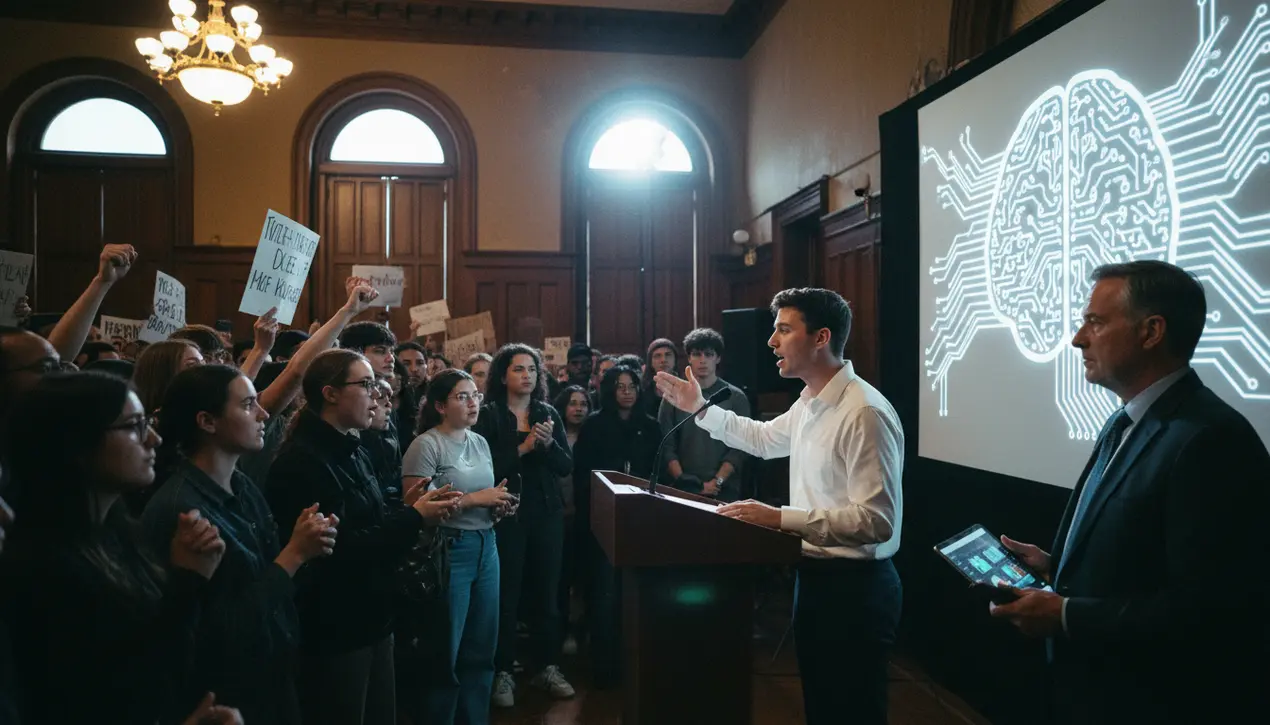
AIai regulation
A battle against the AI oligarchy in a wealthy New York district.
MI
Michael Ross
2 hours ago7 min read1 comments
The political battle over artificial intelligence has found a surprisingly intense frontline in New York’s affluent 12th congressional district, where a crowded Democratic primary is shaping up to be a crucial referendum on how to govern the burgeoning power of the AI industry. This isn't merely a local skirmish; it's a microcosm of a global struggle, echoing the foundational warnings in Isaac Asimov's robotics tales, where the unchecked advancement of technology inevitably clashes with societal well-being.The district, a liberal bastion encompassing Manhattan's wealthy Upper West and East Sides, is witnessing a surge of millennial and Gen Z candidates who recognize that the winner of this primary could become a pivotal figure in Congress, tasked with crafting legislation to curb the most pernicious effects of large language models. The campaign took a dramatic turn with the entry of Cameron Kasky, a Parkland shooting survivor and activist, who has launched a crusade against what he terms the 'AI oligarchs,' a framing borrowed from progressive stalwarts like Bernie Sanders and Alexandria Ocasio-Cortez.His campaign platform delivers a stark indictment, labeling generative AI as 'one of the most societally damaging innovations that humanity has ever created,' and he meticulously outlines a triad of existential threats: the colossal depletion of freshwater resources by energy-hungry data centers, an escalating media literacy crisis that erodes public trust, and the disturbing trend of children seeking AI for therapy and companionship, potentially at the cost of their cognitive development and critical thinking skills. Kasky’s legislative agenda is unflinching, promising to hold AI corporations accountable for their environmental footprint, prevent the mass layoffs automation portends, and impose stringent regulations to protect child safety from tech's pervasive influence, declaring a position of zero tolerance and aggressive intervention.Yet, he is not alone in this fight. Alex Bores, a former data scientist at the controversial firm Palantir, brings an insider's perspective, having already proposed state-level legislation known as the Responsible AI Safety and Education (RAISE) Act.The significance of this local race was underscored when Bores became the first target of a new, well-funded pro-AI super PAC, Leading the Future, which is bankrolled by OpenAI executive Greg Brockman and the venture capital giant Andreessen Horowitz. This group, intent on neutralizing tech critics in Congress, lambasted Bores's RAISE Act as a 'patchwork, uninformed, and bureaucratic' law that would hamstring American innovation and cede the global AI race to China—a classic fear-based narrative used to stifle regulation.Bores, in a savvy political countermove, immediately began fundraising off the attack ads, framing himself as the obstacle to the industry's desire for 'unchecked power. ' While other contenders like state Assemblyman Micah Lasher, non-profit founder Liam Elkind, and attorney Jami Floyd have been quieter on the AI front, the issue's sudden prominence suggests it will become an unavoidable litmus test.Meanwhile, the campaign of Kennedy heir Jack Schlossberg introduced a surreal note, with a tweet pondering whether AI's potential is limited by its lack of sexuality—a query that, while eccentric, highlights the profound philosophical and ethical confusion that surrounds this technology. This primary is more than an election; it's a live-fire exercise in democratic governance of exponential technology, pitting the utopian vision of Silicon Valley against a growing public apprehension, and its outcome will send ripples far beyond the Hudson River, potentially setting the template for how America chooses to navigate the promises and perils of its own creation.
#AI oligarchy
#congressional primary
#New York district
#Cameron Kasky
#Alex Bores
#AI super PAC
#regulation
#featured
Stay Informed. Act Smarter.
Get weekly highlights, major headlines, and expert insights — then put your knowledge to work in our live prediction markets.
Related News
Comments
Loading comments...
© 2025 Outpoll Service LTD. All rights reserved.